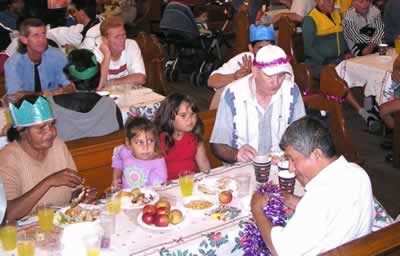The Catholic Weekly, 30 January 2005, p11
by members of the community of St Vincent’s, Redfern
There is surely no more powerful reflection on the authentic meaning of the Eucharist than in the recent letter Mane nobiscum domine of Pope John Paul II.
There is one other point which I would like to emphasise, since it significantly affects the authenticity of our communal sharing in the Eucharist.
It is the impulse which the Eucharist gives to the community for a practical commitment to building a more just and fraternal society.
In the Eucharist our God has shown love in the extreme, overturning all those criteria of power which too often govern human relations and radically affirming the criterion of service: “If anyone would be first, he must be last of all and servant of all” (Mk 9:35).
It is not by chance that the gospel of St John contains no account of the institution of the Eucharist, but instead relates the “washing of the feet” (cf Jn 13: 1–20); by bending down to wash the feet of his disciples, Jesus explains the meaning of the Eucharist unequivocally.
 St Paul vigorously affirms the impropriety of a Eucharistic celebration lacking charity expressed by practical sharing with the poor (cf I Cor. 11: 17-22, 27-34).
St Paul vigorously affirms the impropriety of a Eucharistic celebration lacking charity expressed by practical sharing with the poor (cf I Cor. 11: 17-22, 27-34).
As related in Living the Eucharist (Letters CW January 9), the community at St Vincent’s Redfern is privileged to experience this ecclesial dimension weekly at the “Sharing of the Meal”. The celebration of the Eucharist at the altar is concretised in the sharing of food with the most disadvantaged in our community.
Both the giver and the receiver are nourished by this face-to-face act of loving service.
Pope John Paul II goes on to say: “Can we not make this Year of the Eucharist an occasion for diocesan and parish communities to commit themselves in a particular way to responding with fraternal solicitude to one of the many forms of poverty present in our world?
“I think, for example, of the tragedy of hunger which plagues hundreds of millions of human beings, the diseases which afflict developing countries, the loneliness of the elderly, the hardships faced by the unemployed, the struggles of immigrants.
“These are evils which are present – albeit to a different degree – even in areas of immense wealth. We cannot delude ourselves: by our mutual love and, in particular, by our concern for those in need we will be recognised as true followers of Christ (cf John 13:35; Mt 25: 31–46).
“This will be the criterion by which the authenticity of our Eucharistic celebrations is judged.”
The recent tsunami tragedy is challenging the whole human family and especially Christian communities to a truly Eucharistic response.